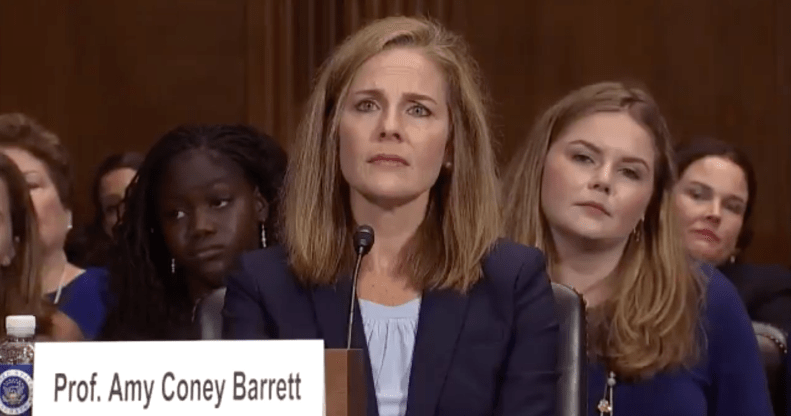Donald Trump to nominate staunchly anti-LGBT+ Roman Catholic Amy Coney Barrett to the Supreme Court

Amy Coney Barrett was told at her 2017 confirmation hearing: “The dogma lives loudly in you.” (YouTube)
Donald Trump is expected to nominate the staunchly anti-LGBT+ Roman Catholic judge Amy Coney Barrett today (September 26) to replace Ruth Bader Ginsburg on the US Supreme Court.
According to CBS, “multiple sources involved in or familiar with the selection process” have confirmed that federal appeals judge Amy Coney Barrett has been chosen by the president. His decision has also been confirmed to the BBC.
Although Trump refused to tell to reporters on Friday evening whether Barrett would be his nomination, he said that he had made a decision in his “own mind”, and described her as “outstanding”.
He added: “You’ll find out tomorrow. Look, they’re all great. It could be any of one them.”
In the week since the death of justice Ruth Bader Ginsburg, whose Supreme Court seat Trump is attempting to fill, Barrett has visited the White House twice to meet with Trump.
He is set to make a formal announcement at the White House on Saturday afternoon.
Who is Amy Coney Barrett?
Concerns over Amy Coney Barrett being nominated by Donald Trump for a seat on the US Supreme Court have been swirling recently because of her anti-gay beliefs and membership of a religious group that declares that husbands are the leaders of their wives.
A part-time University of Notre Dame law professor, Barrett, 48, has previously espoused her view that marriage is between a man and a woman.
In 2015, she signed a letter to the Ordinary Synod of Bishops on the Family, declaring support for “the Church’s teachings… on the meaning of human sexuality, the significance of sexual difference and the complementarity of men and women; on openness to life… and on marriage and family founded on the indissoluble commitment of a man and a woman”.
In 2017, Barrett was grilled by Democratic senators during her confirmation hearing to become a United States circuit judge on whether her staunch Catholic beliefs would affect her judgement on issues such as same-sex marriage and abortion.
Senator Dianne Feinstein told Barrett: “The dogma lives loudly within you, and that’s of concern when you come to big issues that large numbers of people have fought for for years in this country.”
At the time, 27 LGBT+ rights groups opposed Barrett’s confirmation in an open letter, expressing concern that “her religiously-infused moral beliefs would inform her judicial decision-making”.
Barrett is also a member of the Catholic group People of Praise, founded in 1971, which declares that husbands are the leaders of their wives.
The Roman Catholic judge is set to replace Ruth Bader Ginsburg who, in contrast, a feminist icon and champion for equality and LGBT+ rights.
If Barrett is confirmed by the Senate, the Supreme Court would shift to a strong 6 to 3 conservative majority which could remain in place for decades, shaping major legal decisions in the US for years to come.

